最新新概念2教案第一课
新概念英语第二册第一课详细教案
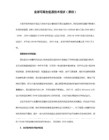
语一般为名词、代词或名词短语,通常位于动词之前。动词必须
“一致”,所以主语决定动词的单复数形式(如 I am, you are, he
。宾语一般为名词、代词或名词短语。在主动句中,宾语一般位
副词时,地点副词的一般位置是在方式副词
通常我们讲
be动词的适当形式填空。
2 / 7
Yesterday was______ the first of
All the students __are____ very excited.
______________________________________________
上教堂,去做礼拜 (cf.第1册第68课at school, at church;
1册第85课have been to school/church)
座位很好
一般指戏院、汽车等配置的固定座位,也可以抽象地表示“座位”
汽车的前座
请坐。
戏很有意思。
属于现在分词形式的形容词,意思是“使人感兴趣”。
fall sick。
4 / 7
上星期我去看戏。
句首的“Last week”点明叙述的事情发生的时间是上星期。因此整
(包括过去进行时),直接引语部分的
动词go的原义是离开一个地方去另一个地方,与介词to连用后,
请注意在以下的短语中名词前通常不加冠词:
上学
上床睡觉
1 / 7
:
( he, she, it,
,动词的词尾要加-S。(一般的动词词尾+S。以sh/ch/s/x结尾的
+es.以辅音字母Y结尾的把Y变成i,+es。辅音字母+o结尾的+es.)
新概念2第一课教案
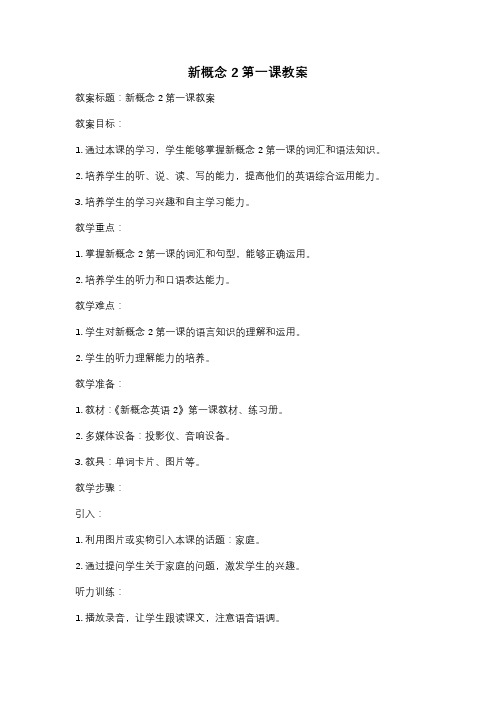
新概念2第一课教案教案标题:新概念2第一课教案教案目标:1. 通过本课的学习,学生能够掌握新概念2第一课的词汇和语法知识。
2. 培养学生的听、说、读、写的能力,提高他们的英语综合运用能力。
3. 培养学生的学习兴趣和自主学习能力。
教学重点:1. 掌握新概念2第一课的词汇和句型,能够正确运用。
2. 培养学生的听力和口语表达能力。
教学难点:1. 学生对新概念2第一课的语言知识的理解和运用。
2. 学生的听力理解能力的培养。
教学准备:1. 教材:《新概念英语2》第一课教材、练习册。
2. 多媒体设备:投影仪、音响设备。
3. 教具:单词卡片、图片等。
教学步骤:引入:1. 利用图片或实物引入本课的话题:家庭。
2. 通过提问学生关于家庭的问题,激发学生的兴趣。
听力训练:1. 播放录音,让学生跟读课文,注意语音语调。
2. 播放录音,学生听录音并完成相关的听力练习。
3. 分组进行对话练习,模仿录音中的对话内容,练习听力和口语表达能力。
语言知识讲解:1. 教师介绍本课的重点词汇和句型,并进行解释和示范。
2. 学生跟读词汇和句型,进行口语练习。
语法练习:1. 学生根据教师的指导,完成相关的语法练习。
2. 教师对学生的练习进行纠正和指导。
拓展活动:1. 学生分组进行角色扮演,模拟对话情景,练习语言交际能力。
2. 学生自由发挥,用所学知识编写小短文,展示他们的写作能力。
总结:1. 教师对本课的重点内容进行总结,并进行复习。
2. 学生进行小结,回答教师提出的问题。
作业布置:1. 布置课后作业,包括完成练习册相关练习、背诵课文等。
2. 鼓励学生自主学习,提供相关学习资源和建议。
教学反思:1. 教师对本节课的教学效果进行评估和反思。
2. 教师根据学生的反馈和表现,调整教学策略和方法。
注:以上教案仅为示例,实际教案编写时应根据具体教学内容和学生特点进行调整和完善。
新概念英语第二册标准教案新部编本第一课

教师学科教案[ 20 – 20 学年度第__学期]任教学科:_____________任教年级:_____________任教老师:_____________xx市实验学校【另附】自我介绍、认识学生、课程简介、学习要求 10’Lesson 1 - A private conversation一、教学重点1、句法:简单陈述句的句子成分(故事六要素)。
Array2、辨析:一般过去时、过去进行时、一般现在时。
3、习语:I can not bear it! It’二、教学步骤【课堂前30分钟】1、引入话题(详见右框)。
2、听一遍音频,掌握大意。
① Where did the writer go last week?② Why didn’t he enjoy the play?③ What did the young man say to the writer?3、生词解读,纠正发音(详见课本)。
4、提问:Why did the writer complain to the peoplebehind him? 看一遍视频,解答问题。
5、精讲课文,板书和笔记(详见下文)。
6、文化背景(详见下文)。
7、再听一遍音频,逐句跟读。
8、学生自己大声朗读。
【课中30分钟】1、做15页的两道选择理解题(详见课本)。
2、检查朗读,一起朗读,注意每一句话。
3、讲解简单陈述句的概念(详见下文)。
4、游戏:讲故事的六要素(详见下文)。
5、练习分析课文中每句话的要素构成。
6、做14页的排列句子成分练习题。
7、做15页最后一道句子结构题(详见课本)。
【课操练部分及复习】1、超级情景背诵图讲解。
2、背课文比赛。
3、听一首英文歌曲《I believe I can fly》。
4、听写单词,记忆法指点。
5、总结本课出现的三种时态:一般过去时、过去进行时、一般现在时(详见下文)。
6、总结本课重点,让学生标注(详见上文)7、布置作业:摘要写作,15页的选择题,背课文和单词。
教案新概念英语第二册标准教案第一课
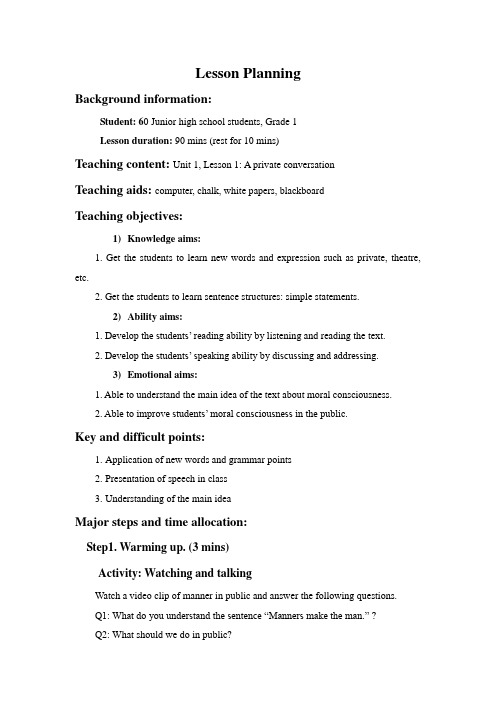
Lesson PlanningBackground information:Student: 60 Junior high school students, Grade 1Lesson duration: 90 mins (rest for 10 mins)Teaching content: Unit 1, Lesson 1: A private conversationTeaching aids: computer, chalk, white papers, blackboardTeaching objectives:1)Knowledge aims:1. Get the students to learn new words and expression such as private, theatre, etc.2. Get the students to learn sentence structures: simple statements.2)Ability aims:1. Develop the students’ reading ability by l istening and reading the text.2. Develop the students’ speaking ability by discussing and addressing.3)Emotional aims:1. Able to understand the main idea of the text about moral consciousness.2. Able to improve students’ moral consciousness in the publi c.Key and difficult points:1.Application of new words and grammar points2.Presentation of speech in class3.Understanding of the main ideaMajor steps and time allocation:Step1. Warming up. (3 mins)Activity: Watching and talkingWatch a video clip of manner in public and answer the following questions.Q1: What do you understand the sentence “Manners make the man.” ?Q2: What should we do in public?Step2. Pre-reading. (3 mins)Activity: Listening.Listen to the tape and then answer the question.Q: Why did the writer complain to the people behind him?Step3. While-reading. (10 mins)Activity 1: Skimming. (4 mins)Read the whole text and answer the following questions.Q1: What is the writing style of the text, narrative writing or descriptive writing?Q2: What is the general idea of the text?Activity 2: Scanning. (6 mins)Scan the text and complete the following tabulation.6 1 2 3 4 5 6When? Who?which?what? Action Who?which?what?How? Where? When?Last week I went to thetheatreI had a verygood seatThe play was veryinterestingI did notenjoythe playA young man and a young womanweresittingbehindmeThey weretalkingloudlyActivity 3: Close reading. (24 mins)1)Vocabulary and phrase.private adj.私人的conversation n.对话theatre n.戏院attention n.注意bear v.容忍turn round 转身pay attention注意none of your business不关你的事2)Sentence structures.1.Simple statements: A statement that tells us about one thing is a simple statement.2.Word order of simple statements: The order of words in a statement can affect the meaning of the statement.3)The tense.1.the past tense2.past continuous tense3.the present tense4)Main idea .Summarize the main idea of this text: Good manners in public are very important.Have a short break. (10 mins)Step4. Post-reading. (38 mins)Activity1. Make a short speech. (15 mins)Make a short speech about manners in public according to the following key words:speak loudly, rudely, knock at the door, spit, smoke, lady first...Activity2. Group work. (10 mins)Discuss with your partner “What did you do yesterday after school?”Use the simple statement to express your idea with right tense.Activity3. Exercise. (13 mins)Do exercise B on your textbook and then we will check it.Homework. (2mins)Finish the rest of exercises on your textbook and preview the next text.。
新概念第二册第一课教案
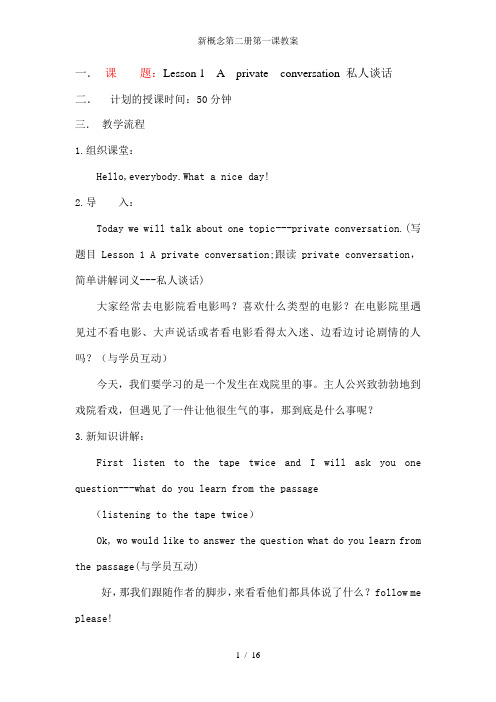
一.课题:Lesson 1 A private conversation 私人谈话二.计划的授课时间:50分钟三.教学流程1.组织课堂:Hello,everybody.What a nice day!2.导入:Today we will talk about one topic---private conversation.(写题目Lesson 1 A private conversation;跟读private conversation,简单讲解词义---私人谈话)大家经常去电影院看电影吗?喜欢什么类型的电影?在电影院里遇见过不看电影、大声说话或者看电影看得太入迷、边看边讨论剧情的人吗?(与学员互动)今天,我们要学习的是一个发生在戏院里的事。
主人公兴致勃勃地到戏院看戏,但遇见了一件让他很生气的事,那到底是什么事呢?3.新知识讲解:First listen to the tape twice and I will ask you one question---what do you learn from the passage(listening to the tape twice)Ok, wo would like to answer the question what do you learn from the passage(与学员互动)好,那我们跟随作者的脚步,来看看他们都具体说了什么?follow me please!(Read the passage following me and read it by the students themselves)生词与短语讲解:1.private/`praivit/adj.○1私人的,秘密的a private conversation/letter 私人交谈/信函Eg: they were sharing a private joke.他们讲着外人听不懂的笑话。
新概念第二册第一课教案1
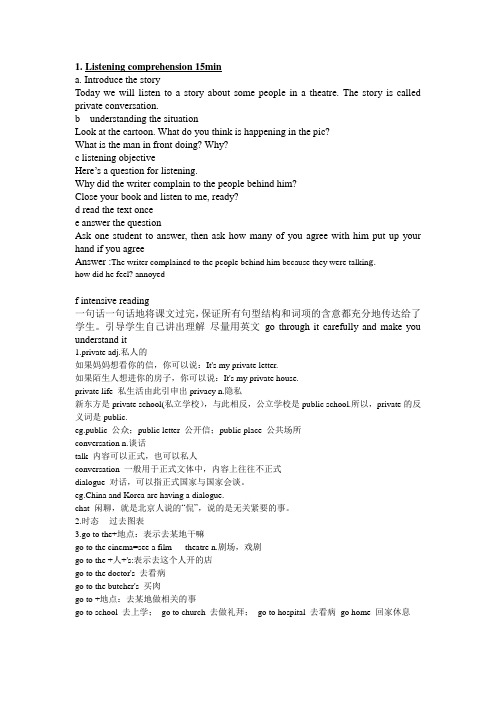
1.Listening comprehension 15mina.Introduce the storyToday we will listen to a story about some people in a theatre. The story is called private conversation.b understanding the situationLook at the cartoon. What do you think is happening in the pic?What is the man in front doing? Why?c listening objectiveHere’s a question for listening.Why did the writer complain to the people behind him?Close your book and listen to me, ready?d read the text oncee answer the questionAsk one student to answer, then ask how many of you agree with him put up your hand if you agreeAnswer :The writer complained to the people behind him because they were talkin g.how did he feel? annoyedf intensive reading一句话一句话地将课文过完,保证所有句型结构和词项的含意都充分地传达给了学生。
引导学生自己讲出理解尽量用英文go through it carefully and make you understand it1.private adj.私人的如果妈妈想看你的信,你可以说:It's my private letter.如果陌生人想进你的房子,你可以说:It's my private house.private life 私生活由此引申出privacy n.隐私新东方是private school(私立学校),与此相反,公立学校是public school.所以,private的反义词是public.eg.public 公众;public letter 公开信;public place 公共场所conversation n.谈话talk 内容可以正式,也可以私人conversation 一般用于正式文体中,内容上往往不正式dialogue 对话,可以指正式国家与国家会谈。
新概念第二课(第一课时)教案(精选五篇)

新概念第二课(第一课时)教案(精选五篇)第一篇:新概念第二课(第一课时)教案新概念第二册第一课《A Private Conversation》教案教案设计设计人:赖老师课题:A Private Conversation 课时:第一课时(40min),新授课(阅读)教学目标:1.熟读课文,掌握课文中的词汇与短语;2.了解在剧院看戏礼仪,培养良好情操。
教学难点:1.回顾与复习一般过去时;2.用英语话概况课文主要内容;3.go to the theatre 与 go to theatre的区别。
教学案例:T(T eacher)Ss(Students)T: Good afternoon, students!Do you like watching movies or plays? 大家喜欢看电影或者戏剧吗?Ss: Yes!T:(To show the posts of the latest movies)T: We call these “movie”.(T o learn the new word)Ss:(T o read after the teacher)T:(To show the posts of the four classical plays in Broadway)We call these “plays”.Ss:(To read after the teacher)T: Where do we watch the movies? Ss: 电影院、剧院T: cinema,theatre Ss:(To read after the teacher)T:(To introduce the Broadway)T: If we speak loudly in the theatre how would the other audiences think of us? 如果我们在剧院里面大声喧哗,周围的观众会怎么样看待你呢?Ss: 生气!会觉得你素质低!T: So everyone knows that the bad manner would bother the others, right? So the word “生气”in English we call “angry”.Ss:(To read after the teacher)T:(To learn and read thenew words and expressions)Ss:(To read after the teacher)T: Before reading our context, let’s think about these questions.The first, where did the writer go last week? The second, why did the writer complain about the people behind him? The third, what did the young man say to the writer? T:(To read the context or play the tape)T:(To ask volunteers to answer the questions)Ss: …… T: 我们想想课文中的第一句go to the theatre是什么意思? Ss: 嗯,应该是“去戏院”的意思。
新概念2教案第一课word.doc
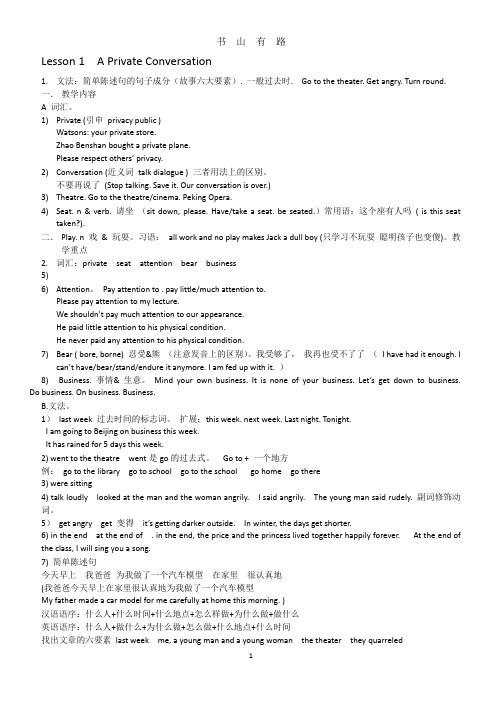
Lesson 1 A Private Conversation1.文法:简单陈述句的句子成分(故事六大要素). 一般过去时. Go to the theater. Get angry. Turn round.一.教学内容A 词汇。
1)Private (引申privacy public )Watsons: your private store.Zhao Benshan bought a private plane.Please respect others’ privacy.2)Conversation (近义词talk dialogue ) 三者用法上的区别。
不要再说了(Stop talking. Save it. Our conversation is over.)3)Theatre. Go to the theatre/cinema. Peking Opera.4)Seat. n & verb. 请坐(sit down, please. Have/take a seat. be seated.)常用语:这个座有人吗( is this seattaken?).二.Play. n 戏& 玩耍。
习语:all work and no play makes Jack a dull boy (只学习不玩耍聪明孩子也变傻)。
教学重点2.词汇:private seat attention bear business5)6)Attention。
Pay attention to . pay little/much attention to.Please pay attention to my lecture.We shouldn’t pay much attention to our appearance.He paid little attention to his physical condition.He never paid any attention to his physical condition.7)Bear ( bore, borne) 忍受&熊(注意发音上的区别)。
新概念二第一课课件Lesson 1 A private conversation教学文稿

I looked at the man and the woman
angrily. They did not pay any
attention.In the end,I could not bear it.I turned round again.’I can’t hear a word!’I said angrily.
新概念英语 二
welcome
主讲老师:Arthur
新概念英语二
新概念英语第二册共计96课,分4个单元(每24课一 个单元)前两个单元是对新一语法的操练和重现;第三 个单元较难,是一些复合句,第四个单元为复习单元, 每单元有一个综合考试。
新二是我们学习英语的一个过渡,同时也是一个转 变。从一个会说日常英语的人转变成一个敢动笔进行基 本写作的人。以96篇小故事为素材,培养学生听、说、 读、写的基本能力,其优势在于扩充词汇、统揽语法、 集合实践、听说兼修。在掌握第一册基本语法的基础上, 由浅入深逐步讲解语法要点,使学习者轻松掌握枯燥的 语法;通过对句型结构的分析及对短语用法的讲解,使 学习者在真正的听说读写中运用地道的句型。
Business is business.公事公办。
10. loudly adv. 大声地; loud adj. 大声的 11. rudely adv. 无礼地,粗鲁的;rude adj. 无
礼的,粗鲁的
形容词与副词
1.区别,形容词一般用于名词之前,表示修饰,be 动词或系动词后表示状态;副词一般是用于动词 之后,形容词之前。(形名前,副动后)
新概念第二册第一课教案
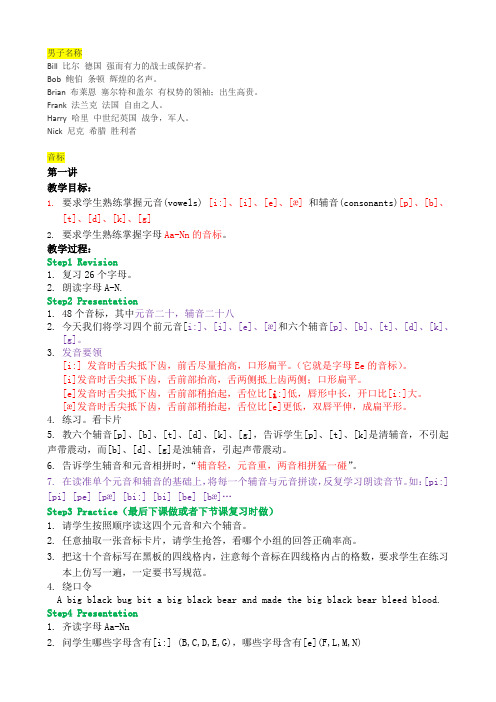
男子名称Bill 比尔德国强而有力的战士或保护者。
Bob 鲍伯条顿辉煌的名声。
Brian 布莱恩塞尔特和盖尔有权势的领袖;出生高贵。
Frank 法兰克法国自由之人。
Harry 哈里中世纪英国战争,军人。
Nick 尼克希腊胜利者音标第一讲教学目标:1.要求学生熟练掌握元音(vowels) [i:]、[i]、[e]、[æ]和辅音(consonants)[p]、[b]、[t]、[d]、[k]、[g]2.要求学生熟练掌握字母Aa-Nn的音标。
教学过程:Step1 Revision1.复习26个字母。
2.朗读字母A-N.Step2 Presentation1.48个音标,其中元音二十,辅音二十八2.今天我们将学习四个前元音[i:]、[i]、[e]、[æ]和六个辅音[p]、[b]、[t]、[d]、[k]、[g]。
3.发音要领[i:] 发音时舌尖抵下齿,前舌尽量抬高,口形扁平。
(它就是字母Ee的音标)。
[i]发音时舌尖抵下齿,舌前部抬高,舌两侧抵上齿两侧;口形扁平。
[e]发音时舌尖抵下齿,舌前部稍抬起,舌位比[i:]低,唇形中长,开口比[i:]大。
[æ]发音时舌尖抵下齿,舌前部稍抬起,舌位比[e]更低,双唇平伸,成扁平形。
4. 练习。
看卡片5. 教六个辅音[p]、[b]、[t]、[d]、[k]、[g],告诉学生[p]、[t]、[k]是清辅音,不引起声带震动,而[b]、[d]、[g]是浊辅音,引起声带震动。
6. 告诉学生辅音和元音相拼时,“辅音轻,元音重,两音相拼猛一碰”。
7. 在读准单个元音和辅音的基础上,将每一个辅音与元音拼读,反复学习朗读音节。
如:[pi:] [pi] [pe] [pæ] [bi:] [bi] [be] [bæ]…Step3 Practice(最后下课做或者下节课复习时做)1.请学生按照顺序读这四个元音和六个辅音。
2.任意抽取一张音标卡片,请学生抢答,看哪个小组的回答正确率高。
新概念第二册Lesson-1教案

Lesson 1A private conversation 私人谈话生词和短语★private adj.私人的it's my private letter/house ;private school:私立学校public:公众的,公开的public school ; public letter 公开信;public place :公共场所privacy:隐私 it's a privacy. adj.《Private Ryan》 private soldier:大兵private citizen 普通公民 private life:私生活★conversation n.谈话subject of conversation:话题 I have a conversation with sb. talk.可以正式,也可以私人的conversation. 比较正式一些let's have a talkThey are having a conversation.conversation 用的时候比talk正式,意思上往往不非常正式. talk:可正式可不正式dialogue:对话China and Korea are having a dialogue. 正式chat: 闲聊gossip:嚼舌头have a + talk/chat/dialogue/conversation/gossip 名词变动词动词:converse with sb;talk with/to sb talk about ;say(vt 说的内容),say sth, he said nothing ;speak(vt 讲语言) (vi 说话,谈话,speak to sb)speech n. make a speech;chat 聊天(talk friendly we had a long chat about old times);discuss (v 有着严肃目的的讨论 discussion);gossip(说闲话,嚼舌头 he is nothing but gossip)★theatre (口语:play house) n.剧场,戏剧(in US :theater UK:metre meter centre-center)Go to the theatre /go to the movies/go to the cinema/ go to the filmTheatre goer 、play goer戏迷cinema: 电影院★seat n.座位have a good seat(place)take a seat : 座下来,就座take your seat/take a seatIs the seat taken? 这个座位有人吗?no/yessit sit down ,pleaseseat take your seat,please、have a seat, pleasebe seated,please 更为礼貌seat是及物动词,后面有宾语sit是不及物动词,后面不加宾语seat后面会加人; seat sb; seat him; seat:让某人就座sit he is sitting there.you seat him;seat 座位:is this seat taken? 这儿能做吗seatbelt 安全带 in the driver’s seat=in the leader’s seat back-seat driver 爱指手画脚的人seat 席位,在国会里 win a seat, lose a seatvt. 安排。
新概念英语第二册第一课教案
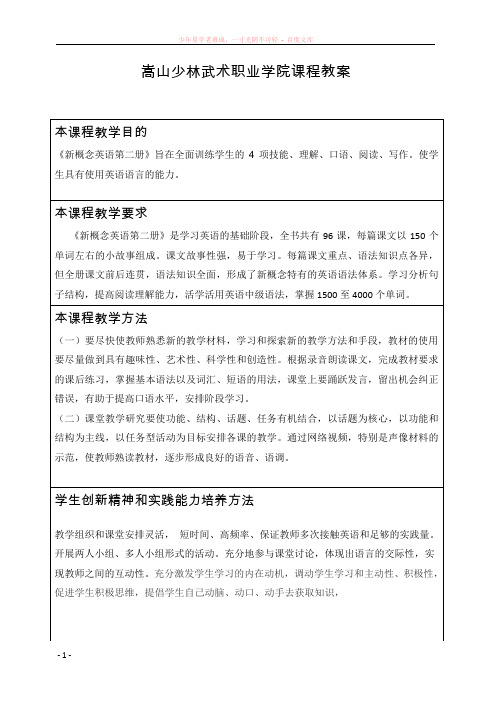
18、private私人的,反义词是public公开的
举例:private letter私人信件- public letter公开信
private school私立学校- public school公立学校
19、conversation一般用于正式文体中,但谈话的内容往往不很正式。
爸爸送给我一辆自行车。Father gave me a bike.
他让我笑了。He made me laughing.
汉语的语序:什么人+什么时间+什么地点+怎样做+为什么做+做什么
例句:我爸爸今天早上在家里很认真地为我做了一个汽车模型。
英语的语序:什么人+做什么+为什么做+怎样做+什么地点+什么时间
12、in the end = at last到最后。in the end of …在…的末尾,可以指时间也可以指空间。
13、I could not bear it!我实在受不了了!这是一句非常有用的习惯用语。
bear = stand忍受、容忍。it代指这整件事。
14、again再一次,又一次。例句:I’m sorry. Can you say it again? I can’t follow you.
10、I looked at the man and the woman angrily.这里的angrily是副词,修饰look at这个动作。
see看见,及物动词,强调结果,see sb./sth.
look看,不及物动词,强调动作,look at sb./sth.
11、They did not pay any attention.这句话之前可以加上连词But。这是个省略句,省略了to me。
新概念第二册第一课详细教案
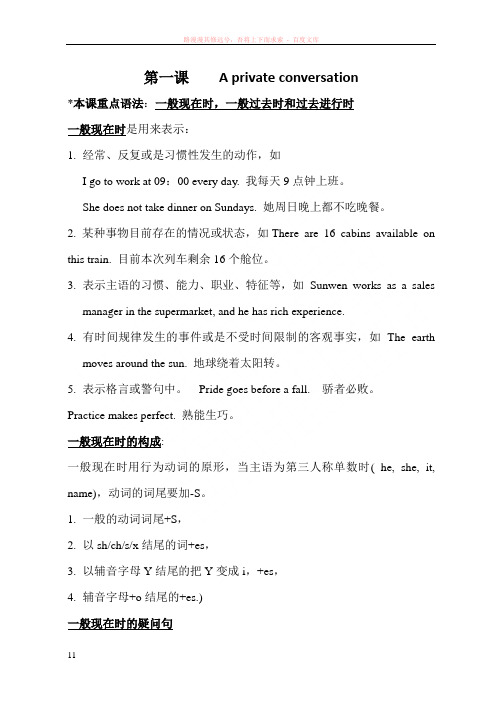
第一课 A private conversation*本课重点语法:一般现在时,一般过去时和过去进行时一般现在时是用来表示:1.经常、反复或是习惯性发生的动作,如I go to work at 09:00 every day. 我每天9点钟上班。
She does not take dinner on Sundays. 她周日晚上都不吃晚餐。
2. 某种事物目前存在的情况或状态,如There are 16 cabins available on this train. 目前本次列车剩余16个舱位。
3.表示主语的习惯、能力、职业、特征等,如Sunwen works as a salesmanager in the supermarket, and he has rich experience.4.有时间规律发生的事件或是不受时间限制的客观事实,如The earthmoves around the sun. 地球绕着太阳转。
5.表示格言或警句中。
Pride goes before a fall.骄者必败。
Practice makes perfect. 熟能生巧。
一般现在时的构成:一般现在时用行为动词的原形,当主语为第三人称单数时( he, she, it, name),动词的词尾要加-S。
1.一般的动词词尾+S,2.以sh/ch/s/x结尾的词+es,3.以辅音字母Y结尾的把Y变成i,+es,4.辅音字母+o结尾的+es.)一般现在时的疑问句助动词DO或Does+主语+动词原形+其它成分。
如Do I look okay? 我看起来还行吗?Does she speak English? 她学英语吗?一般过去时表示过去某个时间发生的动作或存在的状态,通常我们讲述一件过去发生的事情会用这个时态。
动词过去式变化规则:1.一般在动词末尾加-ed,如:pull-pulled, cook-cooked2.结尾是e加d,如:taste-tasted3.末尾只有一个元音字母和一个辅音字母的重读闭音节,应双写末尾的辅音字母,再加-ed,如:stop-stopped4.以“辅音字母+y”结尾的,变y为i,再加-ed,如:study-studied 5.不规则动词过去式:am,is-was are-were, do-did, see-saw, say-saidgive-gave, get-got, go-went, come-came, have-had,eat-ate, take-took, run-ran, sing-sang, put-put,make-made, read-read, write-wrote, draw-drew, drink-drank,fly-flew, ride-rode, speak-spoke, sweep-swept, buy-boughtswim-swam, sit-sat bring--brought can-could cut-cutbecome-became begin-began draw-drew feel-felt find-foundforget-forgot hear-heard keep-kept know-knewlearn-learnt (learned)leave-left let-let lose-lostmeet-met read-read sleep-slept speak-spoke take-tookteach-taught tell-told write-wrote wake-woke think-though练习:一、用be动词的适当形式填空。
新概念二册Lesson1详案

Lesson 1 A private conversation 【New words and expressions】Second , learn the new words by yourself. ★private adj.私人的①adj. 私人的private life 私生活private school 私立学校It's my private letter. (如果妈妈想看你的信)It's my private house. (如果陌生人想进你的房子)② adj. 普通的private citizen 普通公民I’m a private citizen. (citizen n. 公民)private soldier 大兵《Private Ryan》(《拯救大兵瑞恩》)public adj. 公众的,公开的(private 的反义词)public school 公立学校public letter 公开信public place 公共场所privacy n.隐私It’s privacy. 这是我的隐私!(不愿让别人知道的) ★conversation n.谈话have a +talk/chat/dialogue/conversation/gos sip 名词变动词conversation 一般用于正式文体中, 内容上往往不正式subject of conversation 话题They are having a conversation.talk 内容可正式可不正式, 也可以私人Let’s have a talk. dialogue 对话, 可以指正式国家与国家会谈China and Korea are having a dialogue. chat 闲聊,就是北京人说的“侃”,说的是无关紧要的事。
gossip 嚼舌头, 说长道短★theatre n.剧场, 戏剧cinema n.电影院★seat n.座位have a good seat/place,这里的seat 指place(指地点),而不是chair. take a seat/take your seat 坐下来, 就坐Is the seat taken? 这个位置有人吗? 请坐的3 种说法:Sit down, please. (命令性) Take your seat, please.Be seated, please. (更礼貌) 作为动词的seat与sit 的区别sit(sat,sitten)vi. 就座He is sitting there. 他坐在那儿。
新概念2册第一课

教学课题:Making a bookcase.做书架What are you going to do?你准备做什么What are you doing now?你现在正在做什么教学目标:复习现在进行时,初步了解一般将来时教学重难点;一般将来时和现在进行时的区别教学步骤:第一部分----打招呼T;Good morning boys and girls.How are you?S:Fine,thank you,and you.T:It’s a fine day today,what are you going to do after class?那么下课了之后大家都准备去干什么呢?S;……第二部分----引入课题T:Seems that you have a plan about your weekend.Today we are going to learn unit 19.First,we will listen to the ridio,then answer my question.What colour is George going to paint the bookcase?下面我们来听一段录音,听完之后回答我的问题。
乔治打算把书架涂成什么颜色?放录音。
录音完之后问问题T; What colour is George going to paint the bookcase?S:pink第三部分---单词教学T:Good.now let’s look at the new words now.Read after me,I read once you read three times.S:…..T;现在开火车,每人读一个,每个读一遍。
Now start.S;…….T:现在我们看音标认单词,同样从第一个同学开始,one by one.S:……T:接下来我给单词,大家把他的意思告诉我,举手抢答。
- 1、下载文档前请自行甄别文档内容的完整性,平台不提供额外的编辑、内容补充、找答案等附加服务。
- 2、"仅部分预览"的文档,不可在线预览部分如存在完整性等问题,可反馈申请退款(可完整预览的文档不适用该条件!)。
- 3、如文档侵犯您的权益,请联系客服反馈,我们会尽快为您处理(人工客服工作时间:9:00-18:30)。
Lesson 1 A Private Conversation1.文法:简单陈述句的句子成分(故事六大要素). 一般过去时. Go to the theater. Get angry. Turn round.一.教学内容A 词汇。
1)Private (引申privacy public )Watsons: your private store.Zhao Benshan bought a private plane.Please respect others’ privacy.2)Conversation (近义词talk dialogue ) 三者用法上的区别。
不要再说了(Stop talking. Save it. Our conversation is over.)3)Theatre. Go to the theatre/cinema. Peking Opera.4)Seat. n & verb. 请坐(sit down, please. Have/take a seat. be seated.)常用语:这个座有人吗( is this seattaken?).二.Play. n 戏& 玩耍。
习语:all work and no play makes Jack a dull boy (只学习不玩耍聪明孩子也变傻)。
教学重点2.词汇:private seat attention bear business5)6)Attention。
Pay attention to . pay little/much attention to.Please pay attention to my lecture.We shouldn’t pay much attention to our appearance.He paid little attention to his physical condition.He never paid any attention to his physical condition.7)Bear ( bore, borne) 忍受&熊(注意发音上的区别)。
我受够了,我再也受不了了(I have had it enough. Ican’t have/bear/stand/endure it anymore. I am fed up with it. )8)Business. 事情& 生意。
Mind your own business. It is none of your business. Let’s get down to business. Do business. On business. Business.B.文法。
1)last week 过去时间的标志词。
扩展:this week. next week. Last night. Tonight.I am going to Beijing on business this week.It has rained for 5 days this week.2) went to the theatre went是go的过去式。
Go to + 一个地方例:go to the library go to school go to the school go home go there3) were sitting4) talk loudly looked at the man and the woman angrily. I said angrily. The young man said rudely. 副词修饰动词。
5)get angry get 变得it’s getting darker outside. In winter, the days get shorter.6) in the end at the end of . in the end, the price and the princess lived together happily forever. At the end ofthe class, I will sing you a song.7) 简单陈述句今天早上我爸爸为我做了一个汽车模型在家里很认真地(我爸爸今天早上在家里很认真地为我做了一个汽车模型My father made a car model for me carefully at home this morning. )汉语语序:什么人+什么时间+什么地点+怎么样做+为什么做+做什么英语语序:什么人+做什么+为什么做+怎么做+什么地点+什么时间找出文章的六要素last week me, a young man and a young woman the theater they quarreled10、布置作业:摘要写作,39页的选择题,背课文和单词。
1’三、生词解读【NEW WORDS AND EXPRESSIONS】★detective n. 侦探detective story 侦探小说★airport n. 机场★airfield n. 飞机起落的场地port 港口;airport航空港field 田野;airfield 停机坪at the airporton the airfield★expect v. 期待,等待except 除……之外expect/ik'spekt/ v. 期待,等待I think so.I expect so.我希望如此[口语]expect sb.to do sth.期待某人做某事expect sth.及物动词:I expect your letter.I expect you to write back.wait for sth./wait for sb.不及物动词expect:心理上的等待wait for:动作上的等待I wait for my mother.I expect my mother to come back.★valuable adj. 贵重的★precious adj. 珍贵的value n.---valuable adj.有价值的sth.is valuable/sth.is preciousprecious 带有感情色彩的precious photo 珍贵的照片price 价格;priceless adj.-less 表否定;没有价格的,无价的valueless adj. 没有价值,不足道的worth 值:worthless adj. 无价值的★parcel n. 包裹★diamond n. 钻石precious stone 宝石crystal 水晶; jade 玉diamond ring 钻石戒指★steal v. 偷steal,stole,stolensteal sth. 偷(某物)rob sb. 抢(某人)My wallet was stolen.I was robbed.★main adj. 主要的main building; main streetmain sentence; main idea不与人连用★guard n. 警戒,守卫life guard 救生员/body guard保镖★stone n. 石子★sand n. 沙子四、精讲课文1、Detectives were waiting at the airport all (the) morning.这里detectives第一次出现,且只是强调“侦探”这类人,所以可以不用冠词。
过去进行时(强调过去某段时间一直在做某事),标志性时间状语all the time/day/morning wait for sb./sth. at somewhere;at+小地点,in+大地点2、They were expecting a valuable parcel of diamonds from South Africa.expect sth.(心理上的期待) = wait for sth. (动作上的期待)。
expect sb. to do sth.注意expect VS except。
valuable 贵重的VS precious 珍贵的a parcel of... 一包… diamond(jade,crystal)戴梦得珠宝3、A few hours earlier, someone had told the police that thieves would try to steal the diamonds.立足点是侦探们等在机场的时间。
主句用的过去完成时,从句用的过去将来时。
someone 不定代词。
try to do sth. 试图做某事。
a few hours ago 现在之前,以现在的时间为基点往前推,用于一般过去时。
a few hours earlier 比之前更早,以过去的时间为基点往前推,用于过去完成时。
4、When the plane arrived(分句2), some of the detectives were waiting inside the main building while others were waiting on the airfield(分句1).主句是过去进行时,分句1是过去进行时,分句2是一般过去时。
while 后常接进行时(持续性动词)。
when 后常接一般时(瞬时性动词),也可接进行时(持续性动词)。
5、While two detectives were keeping guard at the door, two others opened the parcel.例句:My father is reading newspapers while my mother is cooking.My father was reading newspapers when the telephone rang.注意:这两个动作同时发生(at the same time),但主句动作是想要强调的动作。
while还有另外一种用法,表示转折:例句:He is hard-working while his brother is lazy. (while = whereas)6、Two men took the parcel off the plane and carried it into the Customs House.这里的off有“离开…”之意,而且一般是方向向下。
例句:He kicked the snow off his shoes. She took the painting off the wall.the Customs House = the Customs 海关。
